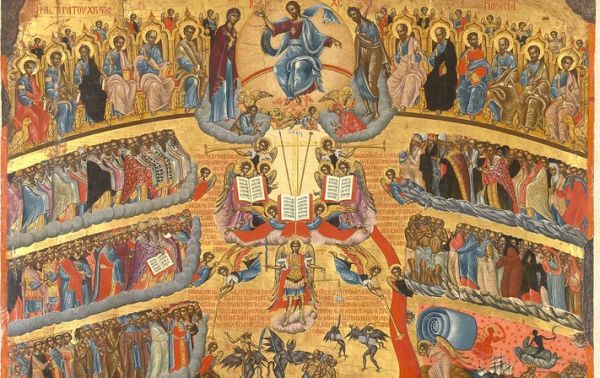Today the Greek Orthodox Church commemorates Apokries, Meatfare Sunday, which is the last day of meat consumption until Pascha.

The Sunday of the Last Judgment or Meatfare Sunday is the third Sunday using the Lenten Triodion, the liturgical book used in the services of Great Lent. It is the Sunday after the Sunday of the Prodigal Son and Sunday before Forgiveness Sunday. This is the third week of the pre-Lenten start of the Pascha cycle of worship in the Orthodox Church.
This Sunday is called Meatfare Sunday since it is traditionally the last day before Easter for eating meat. Orthodox Christians observe a fast from meat all week, but still eat dairy products and eggs till the start of Great Lent.
The Sunday of the Last Judgment is the third Sunday of a three-week period prior to the commencement of Great Lent.
During this time, the services of the Church have begun to include hymns from the Triodion, a liturgical book that contains the services from the Sunday of the Publican and the Pharisee, the tenth before Pascha (Easter), through Great and Holy Saturday.
On this day, the focus is placed on the future judgment of all persons who will stand before the throne of God when Christ returns in His glory.
The commemoration for this Sunday is taken from the parable of our Lord Jesus Christ concerning his Second Coming and the Last Judgment of all, both the living and the dead. In Matthew 25:31-46, Christ speaks about what will happen at this specific point in time when He will “come in His glory, and all the holy angels with Him” (v. 31).
The Gospel reading this Sunday remembers Christ’s parable of the Last Judgment (Matthew 25:31-46).
This adds to the previous pre-Lent Sundays and teaches that it is not enough to see Jesus, to see ourselves as we are, and to come home to God as his prodigal sons.
The Church teaches that, in addition, one must also be God’s sons by following Christ, his only-begotten divine Son, and by seeing Christ in everyone and by serving Christ through them.
Salvation and the final judgment will depend upon deeds, not merely on intentions or even on the mercies of God apart from personal cooperation and obedience.
All piety and prayer are ultimately directed towards the goal of serving Christ through his people.
From the reading, the faithful hear:
… for I was hungry and you gave me food, I was thirsty and you gave me drink, I was a stranger and you took me in, I was naked and you clothed me, I was sick and in prison and you visited me. …. For truly I say to you, if you did it to one of the least of these my brothers, you did it to me (Matthew 25 ).
On the past two Sundays of this pre-Lenten period, the focus was placed on God’s patience and limitless compassion, of His readiness to accept every sinner who returns to Him.
On this third Sunday, we are powerfully reminded of a complementary truth: no one is so patient and so merciful as God, but even He does not forgive those who do not repent.
The God of love is also a God of righteousness, and when Christ comes again in glory, He will come as our Judge. Such is the message of Lent to each of us: turn back while there is still time, repent before the End comes.
This Sunday sets before us the eschatological dimension of Lent: the Great Fast is a preparation for the Second Coming of the Savior, for the eternal Passover in the Age to Come, a theme that is also the focus of the first three days of Holy Week.
But the judgment is not only in the future. Here and now, each day and each hour, in hardening our hearts toward others and in failing to respond to the opportunities we are given of helping them, we are already passing judgment on ourselves.
Another theme of this Sunday is that of love. When Christ comes to judge us, what will be the criterion of His judgment?
The parable of the Last Judgment answers: love—not a mere humanitarian concern for abstract justice and the anonymous “poor,” but concrete and personal love for the human person—the specific persons that we encounter each day in our lives.
The parable of the Last Judgment is about Christian love. Not all of us are called to work for “humanity,” yet each one of us has received the gift and the grace of Christ’s love.
We know that all persons ultimately need this personal love—the recognition in them of their unique soul in which the beauty of the whole creation is reflected in a unique way. We also know that people are in prison and are sick and thirsty and hungry because that personal love has been denied them.
And, finally, we know that however narrow and limited the framework of our personal existence, each one of us has been made responsible for a tiny part of the Kingdom of God, made responsible by that very gift of Christ’s love.
Thus, on whether or not we have accepted this responsibility, on whether we have loved or refused to love, shall we be judged.


